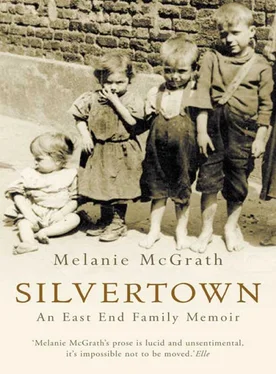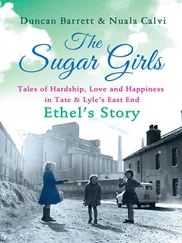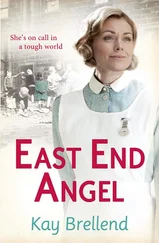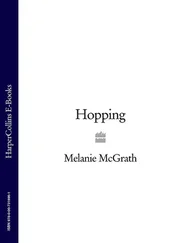What does stand out is Jane’s extraordinary hair, a huge, mobile clump of mahogany brown, so soft that it sails in the wind like a bank of seaweed under waves. I’ll say one thing for her, says Frenchie, shaking his head, she musta bin standing in the giant’s line when the hair was given out. It looks more like an explosion than a bonce.
Mum, where’s the End in East End?
The Docks, Janey love, the Docks is the End. The East End is the Docks.
But Mum, where’s the Beginning then?
Oh Janey, Janey, the questions you ask! How should I know?
You knew where the Finish was.
But it’s harder to say where the Beginning is. Ain’t no East Beginning s’far as I know. There’s only an East End.
In Poplar, the day is divided not into twenty-four hours but into the two shifts of the tides. Since this isn’t so much a practical circumstance as a feeling, it would be more accurate to say that the day is divided into two feelings. A kind of thickness in the air signals high tide. Low tide has the sapping quality of a rainy Sunday afternoon. When the river is low the air is thinner and pulls on the hairs of the skin. As the tide rises, do does the mood; as it falls, the mood falls too.
Aside from this dependence on the tides, the typical Fulcher family day is like that of any other poor London family. Morning begins at dawn when the knocker-up wakes Sarah and Frenchie and the babies with a pebble at the window. Rising from the bed, Sarah goes downstairs to the tap by the privy to fetch water for Frenchie’s shave and, lighting three coals with a handful of kindling, she boils in the copper three tin cupfuls for the shave and a further eight for tea, before waking the children in Little Room. A child is despatched with two pennies and a tin jug to Neal Charles’ dairy in Cottage Place, where there is an outside pump in the shape of a cow’s head. While her husband scrapes his beard, Sarah slices half a loaf from the day before and spreads it with dripping or jam for the older children and soaks a little in sugared milk for the toddlers. If there are leftovers from the day before, then Sarah will fry them up for Frenchie. They eat on their laps with their breath pooling in the cold air of the room, the younger ones sipping warm sugary water, the older ones washing down their bread with sweet tea from the tin mug.
At six-thirty Frenchie joins the procession of men heading south towards the docks to the bomp-on for work, men in quiet waves, whistling against the cold. The Fulchers will not see him again till teatime at seven, or if it is a Friday, not till he rolls in from the pub singing ‘Mother Brown’. A little later the coal man, the beigel man, the cat’s meat man, the haberdasher, the tinker, the pie man and the rag and boner begin making their way along St Leonard’s Road, while in the neighbouring streets, doors fly open and women spill out on to the pavement, their hair all done in rags and curlers, eyes beady for a bargain.
Back at Ullin Street, the children scrub their necks and faces at the tap in the yard then the older ones sling on their jackets and head towards the red brick box at Bright Street, which serves as a school. By midday they will be back for lunch, to warmed rooms smelling of their mother’s chores. After school the girls will be sent out to fetch saucers of pickles or an egg or two from the grocer’s and the boys will be sent to the coal yard for coal dust at a farthing a bucket to make the coals go further. Then Frenchie will sail home hard and sweating from the day, a pilfered orange or a few raisins in his pocket. Look what old Frenchie found in the docks, nippers. Sarah will make sweet tea and put a new half-loaf on the table with marg and jam. Sometimes they will have a few potatoes with gravy or a hard-boiled egg with vinegar pickles and then, unless it is raining very hard or the cold is unbearable or they are sick, the children will play in the street – rope games, ginger, blind man’s bluff. Frenchie will sink into his dilapidated chair with his Daily Mirror and quarter ounce of shag and shake his head at the injustices of the world, while his wife sits beside him, mending rips and holes. And when the children are in bed and their overcoats are spread over their warming toes, Frenchie will tell them stories.
Frenchie’s head is a cargo of stories. He’ll tell them about the docker who was pushed into the oily water by a side of beef swung from a ship, and how his fellows made a fire right there on the quayside and roasted that side of beef in tribute to their lost friend. He’ll tell them about the parrots which came in on a boat from Uruguay and swore in fourteen different languages, or about the performing monkeys which could write the alphabet. He’ll tell them tales of everyday life on the docks. He’ll tell them about the sugar porters whose flesh is so raw from the sharpness of their cargo that the bluebottles get in underneath their skin and lay their eggs. How on a summer’s day you can tell a sugar porter by the clouds of tiny flies bursting from his limbs. He’ll tell them about the tarantulas they pull from banana hands, scooping them up into tobacco tins to give them to their dogs to kill. He’ll tell them about the oilmen, whose skin is like thick, black leather from the tar they scrape from the inside of the oil ships, about the potash haulers with faces white as ghosts coughing bloody spume into cloths; about the corn porters with their flour rashes and the sulphur men whose hair stinks of rotten eggs.
Frenchie knows things. He knows that London was once under the sea and there are shells embedded in the stones of Poplar Library. He knows where the plague pits and the bear-baiting dens used to be. He can point out where the Vikings thundered up the Thames in their longboats and where they got befuddled by the eddies and drifts at Bow Creek. He knows that the body of a whale was dug up out of the marsh at the West India. He’s witnessed dogfights. He knows where to find bare-knuckle fighters or nancy boys.
Jane Fulcher’s favourite story, one her father often tells, concerns two mastiffs and a cow. The cow had been left to graze on the marsh south of Poplar in the loop of the Thames. The dogs, whose job it was to protect the cow from hungry poachers, were chained to the animal’s feet. Every week a marshman came along and left meat for the dogs and between times they dug for worms and pounced on any small thing that crossed their path. But a mist came down as mists often did in the marsh and the cow, wandering about and unable to see its feet, stumbled on its chains and fell into a nearby bog, catapulting its unfortunate protectors into the quicksand. After a struggle the cow sank into the slime and died but, being lighter, the dogs remained on the surface for a while longer. For four days and nights the residents of Poplar heard a terrible wailing, but were too frightened to go down to the bog and see what was afoot. Rumours rushed around that the devil had landed in the marsh and was taunting them before making his move. When the marshman eventually returned to check on his charge he found two mastiff heads preserved in the marshy brine, their jaws open as if in a long, last howl of injustice. And that is how, Frenchie says, the Isle of Dogs got its name.
The stories have a fearful power. Whenever his children are defiant, Frenchie threatens to abandon them on barges that will carry them out on the tide beyond Southend to the Black Deep where their bodies will be consumed by whales and sea snakes.
Whales and sea snakes, nippers, whales and sea snakes.
Конец ознакомительного фрагмента.
Текст предоставлен ООО «ЛитРес».
Прочитайте эту книгу целиком, купив полную легальную версию на ЛитРес.
Читать дальше












